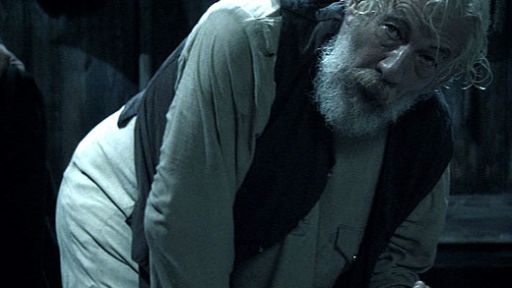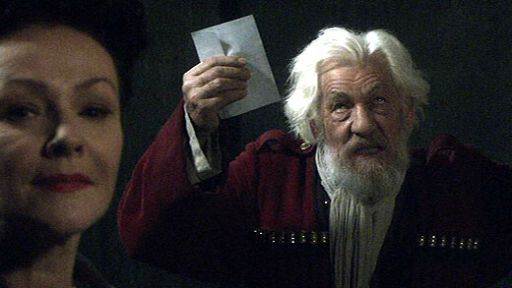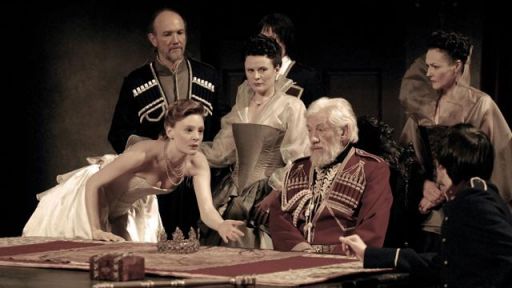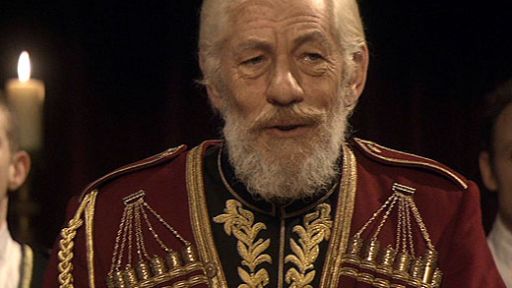All the forces that play themselves out in Acts IV and V have been put in place and complicated to some degree by the end of Act III. While Lear’s problems have occupied the foreground until the blinding of Gloucester ending the act, we have hints in the background of an impending invasion from France, serious enmity between Albany and Cornwall, Edmund’s ambitions expanding beyond his new title of Duke of Gloucester, and a suggestion that Edmund has won the hearts of the two daughters. Meanwhile, both Lear and Gloucester, representing the two plots, have reached some low point in their dramatic histories, from which each will migrate to some new and perhaps, or perhaps not, improved station. However, the ending is not foretold. As the play’s story both before and after Shakespeare shows, a romantic ending is still possible, in which Cordelia and Lear prevail. That no one can be said to prevail at the end of Shakespeare’s play keeps the tragic mood intact, but it is not inevitable.
Act IV. Scene 1
“Tis the time’s plague when madmen lead the blind.” (Gloucester, of Edgar)
Edgar, in monologue, decides his maligned state is better than hypocritical flattery, and that hope always follows despair. He then espies his father led by an old man, and is suitably shocked by what he sees: “World, world, O world.” Gloucester has sunk into complete despair: “I have no way, and therefore want no eyes.” Edgar sees that what he thought was the worst has gotten worse still. Gloucester hints that his meeting of mad Tom the night before brought his son to mind, a sad thought: “As flies to wanton boys are we to the gods—they kill us for the sport.” The old man identifies mad Tom, and Gloucester suggests that such a person is a perfect fit to lead him on. Edgar of course agrees, but he maintains his “mad Tom” speech. In a gesture to biblical redistribution to the poor, Gloucester gives Edgar his purse to give away, “and each man have enough.” He then asks Edgar to lead him to Dover and its cliffs, hinting that his purpose is to throw himself from their heights.
pix 25
Edgar never identifies himself to Gloucester as his forsaken son, here or in any later scene. This seems odd, and to some rather cruel. However, this play has not a sentimental note other than the moment of reunion between Cordelia and Lear, which is only sentimental if staged that way. Any reunion between Gloucester and Edgar that would suggest happiness or relief would ruin the persistence of tragedy in the play. The tragic mode here takes the form of human alienation, each person isolated from the others in profound and unchangeable ways. Albany must mean it at the end when he says, “our present business is general woe.”
Act IV. Scene 2
“Wisdom and goodness to the vile seem vile” (Albany)
Goneril and Edmund arrive at Goneril’s castle. Oswald notes a severe change in Albany’s mood towards Goneril, now of acute hostility. Albany also sees Edmund’s supposed loyal service as the opposite. (Albany now joins Edgar as the play’s moral voice.) Goneril sends Edmund away with a number of sexual innuendos, and then greets Albany. He condemns her in the harsh language we have by now become accustomed: “You are not worth the dust which the rude wind blows in your face.” He reviles her treatment of Lear, to which she responds in kind: “milk-livered man . . .” She urges that France has landed, and he does nothing; he replies by blaming her for the invasion in language reminiscent of Lear’s in Act I, that were he of a mind he would “dislocate and tear thy flesh and bones.” A messenger enters to disclose the death of Cornwall, during which Albany learns of the blinding of Gloucester. His rage increases. But Goneril now sees good and bad in the news, that Regan is now free to claim Edmund, but reduced in power relative to herself. She takes the messenger’s letter from Regan and leaves to answer. The messenger then reveals Edmund’s role in betraying Gloucester.
pix 26
Shakespeare at times uses minor characters to provide a clear moral voice, or carry a play’s moral conflict. Horatio provides the moral voice of Hamlet, and Jessica carries a central moral conflict in Merchant of Venice. Here Albany assumes the play’s political and domestic moral voice. How he has come to understand the menace of his wife and her sister is not revealed, but he clearly understands it.
Act IV. Scene 3
“The stars above us govern our conditions, else one self mate and make could not beget such different issues.” (Kent)
Kent encounters the knight or gentleman to whom he entrusted messages in Act III, who discloses that the King of France has returned to France to cure some imperfection in the state, leaving his army in the hands of the Marshal of France (about whom we never hear again). He also confirms that Cordelia had gotten Kent’s message, to which she responded with “sunshine and rain at once, her smiles and tears were like a better way.” It becomes clear that she had read the letter on English soil, attending the army. Kent then describes Lear’s present location and condition, in Dover, and in such despair that he dares not see Cordelia. Kent takes the gentleman to Lear to look after him.
pix 27
This is the second important scene found in the first text (1608) but missing in the second (1623). It has no dramatic value, but it does provide some needed information about Cordelia’s whereabouts, why the King of France does not lead his own army, and Cordelia’s sense of her father at this point, that is, forgiveness. The scene puts a halo on Cordelia’s head, one fulfilled a few scenes later. Most directors and editors put the scene in for these reasons. Note, however, that the Nunn Lear for PBS omits it, hence there is no corresponding picture from the film.
Act IV. Scene 4
“Crowned with rank fumiter and furrow-weeds, with burdocks, hemlocks, nettles, cuckoo-flowers, darnel, and all the idle weeds that grow in our sustaining corn” (Cordelia, of Lear as she has heard of him).
Cordelia appears in full military regalia, or at least in charge of the French military forces (we are led to assume). She describes what she has apparently heard of Lear’s condition, “mad as the vexed sea” and wearing a crown of weeds. She orders sentries to be sent forth to find and collect him. She is then advised that the British armies advance. She knows this already, and prepares for battle.
pix 28
While this scene seems a bit out of place, it brackets the enormously moving scenes with Edgar, Gloucester, and Lear that soon follow, framing their implicit humanity with the sirens of war. The imagination of the audience is called upon here for much work.
Act IV. Scene 5
“It was great ignorance, Gloucester’s eyes being out, to let him live.” (Regan)
Oswald speaks with Regan. She asks him if Albany’s forces have been deployed. He acknowledges it, but says that Goneril actually leads them: “your sister is the better soldier.” He then discloses that he has a letter for Edmund which he must deliver. Regan suggests that Edmund has taken after Gloucester to kill him, as they realize that, alive, he “moves all hearts against us.” She wants to see the letter, attempts a little seduction, but Oswald refuses. She then declares that she is free, Goneril not, that Goneril was obviously flirting with Edmund, but she, Regan, is the more convenient match. She sends Oswald off with a promise of some reward if he happens to find and kill Gloucester. He responds ambiguously—that if he should encounter Gloucester, his real loyalty would be revealed—and leaves.
pix 29
We are now engaging the second plot as it begins to unravel, without ever seeing its formative stages. Regan has displaced her desire for power with an irrational desire for Edmund, seemingly unaware that Edmund is playing both sides for power alone. Doom is about all one can expect from these circumstances.
Act IV. Scene 6a
“O you mighty gods, this world I do renounce” (Gloucester)
Edgar leads Gloucester into a field. He has noticeably changed his speech patterns, noticed at least by Gloucester, even as Edgar denies it. Edgar gives a vivid description of a cliff, the drop off it, and the scene below, convincing Gloucester that he has indeed climbed a hill and is indeed on the verge of the cliff. He gives Edgar a purse with a jewel for his troubles. He then offers a caustic prayer to the gods and hurls himself off the cliff. As he has only fallen into sand or weeds, he revives, to find Edgar hovering over him. “Away and let me die,” he says. A new Edgar, marked by different speech, declares his life a miracle—he fell from the summit and survived. In an almost cruel twist, Edgar asks Gloucester not to look up, lest (we are to suppose) the height might scare him to death. Gloucester says the obvious, that he has no eyes, and laments to some extent that his death would have frustrated the tyranny around him. Edgar cheers him up, and Gloucester promises to bear affliction until he dies naturally.
pix 30
This is obviously a hard scene to make believable. Some Gloucesters actually pass out in falling, or just before falling, so they are not conscious during what they imagine to be a long descent. The point, of course, is to have Gloucester follow Lear into successive levels of despair until each is rescued by someone who really loves them, but who they have ironically spurned. Quite a few question Edgar’s moral stance here, deluding his father into an attempted suicide rather than disclosing his existence as his only loving son, but that would be a sentimental twist, and this play blunts the sentimental instinct at every turn.
Act IV. Scene 6b
“When we are born we cry that we are come to this great stage of fools.” (Lear)
This is the first of two great reconciliation scenes, this one with Lear and Gloucester, the next with Lear and Cordelia. Lear appears on stage as if alone. He is mad, but cannily so, and will either be wearing a crown of weeds or fashion one during the scene itself. He declares his authenticity—“I am the King himself”—but then communes with his natural surroundings, as “nature is above art in that respect,” including a short conversation with a mouse. Edgar notes his mad state, but Lear then begins to see things right for the first time, admitting that his daughters lied to him, that words were not the same as meanings or deeds. He claims some kind of vision in the storm, that he was told he was a god, but he was not immune to human weakness. Gloucester recognizes his voice (strange that he cannot recognize Edgar’s voice). Lear in turn seems to recognize Gloucester by calling attention to his sin, giving a madcap monolog on sex and adultery. “Let copulation thrive.” Gloucester asks to kiss his hand. Lear replies, “Let me wipe it first, it smells of mortality.” Gloucester turns apocalyptic, they exchange some figures on blindness and insight: “a man may see how this world goes with no eyes.” Lear then gives a long, impassioned, but vernacular speech on justice before asking his boots to be removed (which he may or may not have on). Edgar sums up his mood: “reason in madness.” Finally, as the two may embrace, Lear imagines them on a stage of fools, leading an army against his son-in-laws, to “kill, kill, kill, kill, kill.”
pix 31
This is another section of the play that is hard to follow without knowing the words, and the words are among the most confusing for a twenty-first century viewer. It is worth reading the scene and trying to puzzle out how it might be staged, to see how “reason in madness” really works. That being said, this scene can produce the most profound sense of human connection the play has to offer, which sense can be conveyed by how Lear and Gloucester relate physically. The mad Lear holding the blinded Gloucester can be magical.
Act IV. Scene 6c
“I am the natural fool of fortune.” (Lear)
A gentleman with attendants appears, calling upon the attendants to seize Lear on his daughter’s behalf. Lear misunderstands and thinks he has been captured. In his antic mood, he promises to die bravely. His captors declare him their king and release him, but he runs off the stage as if a kind of game. The gentleman remains, in part to explain to the audience that they represent Cordelia. Edgar then asks him the meaning of the noise they hear. It is the sign of an impending battle, to begin within the hour perhaps. The gentleman suggests that Cordelia is nearby, but her army has moved on. After the gentleman leaves, Gloucester repeats his pledge to die naturally. He asks again who Edgar may be, and Edgar again gives an elliptical reply, refusing to acknowledge himself to his father.
pix 32
Act IV. Scene 6d
“The letters he speaks of may be my friends.” (Edgar)
Oswald enters and sees Gloucester, the traitor. Almost gleeful (he has beat Edmund to it), he draws to kill him, but Edgar intervenes and kills Oswald instead. Before dying, Oswald asks Edgar to deliver a letter from Goneril to Edmund in which she declares herself for him as future wife as soon as Albany had been disposed of. Outraged he promises to himself to advise Albany of the plot (rather as Edmund has used a similar captured letter to undo Gloucester). He drags the body offstage, returns as Gloucester meditates on his own sorrows, and as drums sound in the background takes his father to a safer place.
pix 33
This scene has an awkward administrative feel. As satisfying (to the audience) as Edgar killing Oswald may be, he is hardly the high villain of the play. Indeed, he is loyal, and early in the play rather diffident; his attack on Gloucester can be seen as the proper punishment for Gloucester’s clear treason, an act of honor. But Edgar must somehow get hold of the letter. Oswald must be expensed in the process.
Act IV. Scene 7
“No cause, no cause.”
Cordelia praises Kent’s goodness, who deflects it: “to be acknowledged madam is over paid.” She encourages him to change back to his normal clothing, but he declines, until “time and I think meet.” A gentleman comes in to say the Lear is sleeping, but that he has slept a long time and perhaps should be wakened. As Cordelia advises him to take his own counsel, Lear is carried in on a chair or bed. He has been dressed and cleaned, an important sign of his gradual revival. Cordelia orders the music louder, and leans over to kiss Lear on the forehead. She speaks kindly of what he has endured, suggesting that a lesser soul would have succumbed entirely. At last he awakes, in a kind of stupor, protesting that he should not be taken from the grave: “Thou art a soul in bliss, but I am bound by a wheel of fire that mine own tears do scald like molten lead.” She asks if he knows her; he seems not to immediately, asking instead where he has been. He is not sure he is sentient. He tries to move, she restrains him, and he laments his age (80), a less than perfect mind, and that he remembers so little. Finally he says, “I think this lady to be my child Cordelia.” “And so I am, I am” she replies, and weeps. He stills her tears, and says, “I know you do not love me, for your sisters have, as I do remember, done me wrong. You have some cause, they have not.” “No cause, no cause” is her reply. He wonders if he is in France. Assured he is in England, Lear relaxes and at the gentleman’s urging, repairs to rest. Cordelia, Kent, and the gentleman then get to the business of war.
pix 34
This may be the most difficult scene in the play to stage and act. Cordelia has to be sincere but not sentimental. Lear has to become gradually aware of his surroundings while seeming competent to speak the memorable words he speaks and feel what he must feel, being touched by the infinite hand of forgiveness. The whole scene is saturated with monosyllables, the simplest of words. Yet they must mean everything.





